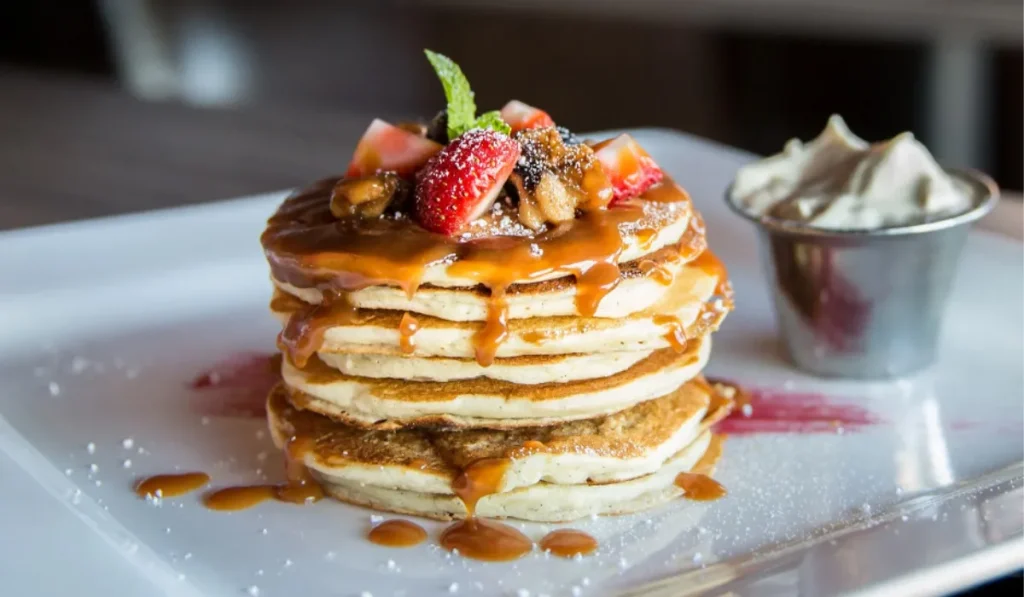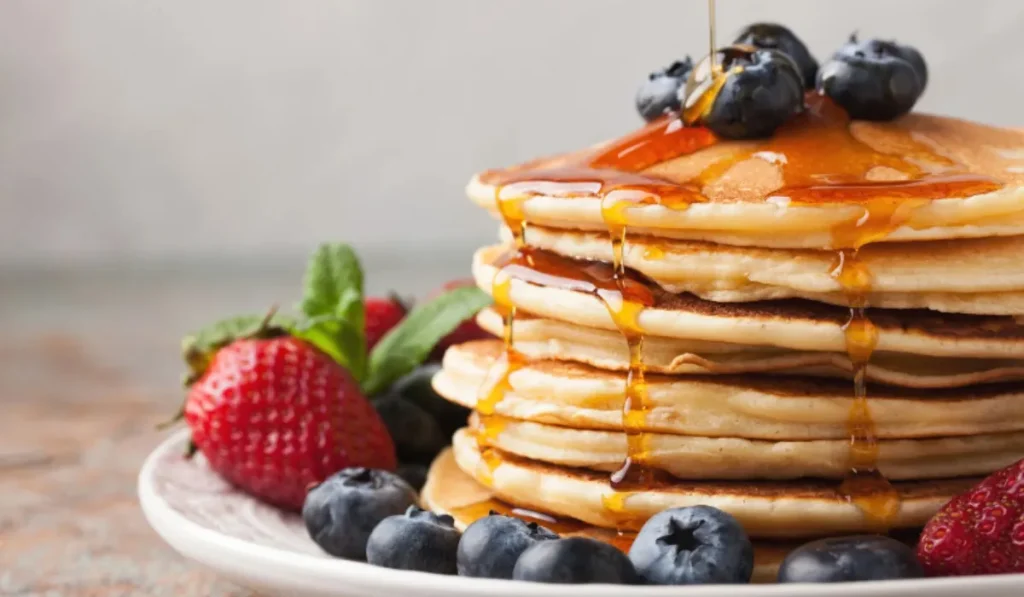A standard pancake weighs about 50 grams (1.76 ounces). The weight can vary depending on the recipe and pancake size.
Pancakes have become a staple breakfast item in many cultures around the world. Their appeal lies in their simplicity and versatility, with countless recipes allowing chefs and home cooks to create their unique spin on the classic dish.
Whether you’re sitting down to a stack of fluffy American-style pancakes dripping with syrup or enjoying a thinner, crêpe-like version, one thing remains consistent – the joy that a well-made pancake brings to your taste buds.
Pancake weight is not just trivia; it’s a significant detail for those tracking their nutrition or managing ingredient proportions for the perfect batter consistency.
From the cozy diner kitchen to the bustling home breakfast table, pancakes continue to be a timeless favorite, inviting everyone to indulge in their light, comforting embrace at the start of the day.
Quest For The Perfect Pancake
The Quest for the Perfect Pancake starts with picturing that golden-brown disc, light and fluffy, with a melt-in-your-mouth quality that pancakes are famous for.
How much does this culinary masterpiece weigh? The weight can vary, but the journey to achieve the perfect pancake is one of precision, care, and the right ingredients.
So, let’s embark on this delicious adventure and unlock the secrets to creating the ultimate pancake.
Ideal Ingredients For Fluffiness
The magic of the fluffiest pancakes starts with choosing the right components. A balance of flour, baking powder, and some form of leavening is essential. To enhance the fluffiness, here’s a checklist to consider:
- All-purpose flour – the foundation of pancake structure.
- Baking powder – the crucial leavening agent.
- Buttermilk – introduces acidity for lift.
- Whipped egg whites – a secret weapon for airiness.
Use these ingredients in the right proportions to ensure every pancake weighs just enough to provide that satisfying texture without being too heavy or too light.
Role Of Measuring In Pancake Consistency
Consistent pancakes require precise measurements. Not guessing, but using the right tools. A kitchen scale ensures each pancake is equal in weight and size. The process is simple:
- Weigh your batter
- Calculate based on desired pancake size
- Portion the batter for each pancake accordingly
Consistency is king in creating pancakes that are not just delicious, but predictably so. Perfecting the science of measurement will lead to pancakes that are just-right every time.
Weights And Measures In Pancake Batter

Ever wondered about the precise weight of a scrumptious pancake before it hits the griddle? Understanding Weights and Measures in Pancake Batter is key. This knowledge helps ensure consistency in texture, cooking time, and flavor.
Standard Weights For Common Pancake Types
Each pancake type has its own standard weight. This varies with ingredients and sizes. Here’s a quick guide to common weights:
- Classic Buttermilk Pancake – Around 50 grams (1.76 ounces)
- Mini Pancakes – Approximately 15 grams (0.53 ounces)
- Large Diner-Style Pancakes – Can weigh up to 95 grams (3.35 ounces)
Metric Vs. Imperial: Navigating Measurement Systems
The baking world uses two main systems: metric and imperial. Knowing both is crucial when following recipes from different countries.
| Measurement | Metric (grams) | Imperial (ounces) |
|---|---|---|
| 1 Cup of Flour | 120g | 4.23oz |
| 1 Tablespoon of Sugar | 12.5g | 0.44oz |
| 1 Teaspoon of Baking Powder | 4g | 0.14oz |
Always check the type of measurement a recipe uses. Use a scale for precise baking. Convert weights if necessary for accuracy.
Variations In Pancake Weights

Variations in Pancake Weights can tickle the curiosity of any breakfast enthusiast. From the petite and delicate silver dollar pancake to the hearty, plate-filling stack, pancakes are a diverse bunch.
Each style and recipe yields a different weight, influenced by ingredients, size, and thickness. Let’s dive into the world of pancakes and explore how much these delightful treats can weigh.
Thin Crepes Vs. Thick Flapjacks
The debate between thin crepes and thick flapjacks is not just about taste and texture but also weight.
On one side, crepes are elegantly thin, typically weighing around 50 grams (1.76 ounces) each. On the other, thick and airy flapjacks tip the scales at roughly 100 grams (3.53 ounces). Here’s a quick look at their differences:
| Type | Average Weight | Characteristics |
|---|---|---|
| Crepes | 50 grams | Thin and light |
| Flapjacks | 100 grams | Thick and fluffy |
Impact Of Add-ins And Toppings On Weight
Pancakes rarely hit the griddle alone; they are often accompanied by delicious add-ins and toppings.
These companions significantly affect the total weight. Sliced bananas, walnuts, or chocolate chips can add another 25 grams (0.88 ounces) or more.
- Blueberries: About 10 grams (0.35 ounces) per tablespoon
- Chocolate Chips: Around 15 grams (0.53 ounces) per tablespoon
- Whipped Cream: Nearly 5 grams (0.18 ounces) per dollop
Remember, with heavier toppings like nuts or syrup, the scale can tip even further. It’s essential to account for these add-ons when calculating the total pancake weight.
The Science Of Weighing Your Pancake
The perfect pancake is a thing of precision. It might seem simple, but the weight of a pancake plays a crucial role in its texture and taste. Unlocking the secrets behind the perfect breakfast starts with understanding the science of weighing your pancake.
The Importance Of Scales In Baking
Baking is a science where accuracy is key. Small mistakes can lead to big problems. Using scales can make the difference between fluffy and flat pancakes.
Precision in measuring ingredients ensures consistency every time you cook. No more guessing – just perfect pancakes.
- Ensures uniformity – Every pancake is just as tasty as the last.
- Reduces waste – Exact measurements mean no excess mix.
- Helps replicate recipes – Get the same delicious results every time.
How To Weigh Ingredients For Precision?
Measuring ingredients for pancakes is more than just scooping and guessing. Here’s how to nail the precision:
- Start with a digital scale. It’s the most accurate tool for the job.
- Zero out your scale. Place a bowl on top and return the scale to zero.
- Pour your ingredients into the bowl. Watch the numbers and stop at the right weight.
- For liquids, use a measuring cup on the scale to ensure perfect volume.
Remember, consistency is not about luck. It’s about the right tools and techniques. Weigh everything from flour to milk, and say hello to the best pancakes you’ve ever made!
Healthy Pancakes And Their Weights
When it comes to healthy eating, pancakes can be on the menu. The weight of a pancake can vary depending on the ingredients used.
A standard pancake might weigh around 60 grams, but healthy alternatives often weigh less. Let’s dive into making these light but delicious choices.
Exploring Lighter Options: Ingredient Swaps
Making pancakes lighter starts with smart ingredient swaps. These changes not only reduce the weight of our pancakes but boost their nutritional value.
- Whole wheat flour over white – rich in fiber
- Almond milk instead of whole milk – less fat, fewer calories
- Egg whites over whole eggs – cuts down on cholesterol
- Banana or applesauce for sweetening – natural sugars and extra vitamins
These swaps will result in pancakes that are lighter in weight. For example, a pancake made with these alternatives might weigh 50 grams. It’s a small change with a big impact!
Balancing Nutrition With Indulgence
Eating healthy should still be joyful. Strike a balance between nutrition and indulgence to keep breakfast exciting.
| Ingredient | Weight Reduction | Nutritional Benefit |
|---|---|---|
| Oats | -10g | Fiber boost |
| Greek yogurt | -5g | Protein addition |
| Chia seeds | -2g | Omega-3s |
By adding oats, Greek yogurt, and chia seeds, you create a pancake that’s not only lighter but packed with nutrients. A fluffy stack with these ingredients might come down to 45 grams per pancake. Plus, they’re delicious!
Fun Facts And Pancake Trivia
Welcome to a delightful toss-up of Fun Facts and Pancake Trivia. Fluffy, golden, and sweet, pancakes are a breakfast favorite.
But ever wondered about the tales and scales behind these griddle-crisped delights? Let’s weigh in on some fascinating tidbits about pancakes from around the globe.
Record-breaking Pancakes Around The World
Thrill-seekers of culinary marvels, behold! Pancakes have made some gigantic leaps in the record books.
- The heaviest pancake weighed 6,614 pounds and measured 49 feet in diameter, flipping into the Guinness World Records.
- In Rochdale, England, chefs achieved a pancake flip reaching 31 feet and 1 inch high.
Cultural Variations And Their Unique Weights
Pancakes vary wildly across borders, adding a pinch of cultural essence and a dash of tradition. Below is a glimpse of how these variations tip the scales.
| Type of Pancake | Origin | Average Weight |
|---|---|---|
| American Buttermilk Pancake | USA | 50 grams |
| French Crêpe | France | 30 grams |
| Dutch Poffertjes | Netherlands | 15 grams each |
| Japanese Okonomiyaki | Japan | 300 grams |
Whether they’re paper-thin crêpes or hearty okonomiyakis, pancakes offer a taste of culture with every bite.
So, the next time you dig into a stack, remember the diversity and records they hold!
FAQs About The Weigh of A Pancake
What Is The Average Weight Of A Pancake?
The typical weight of a homemade pancake ranges from 30 to 50 grams. Commercial pancake mixes may yield pancakes that vary in weight depending on the added ingredients and individual serving sizes.
How Many Calories Are In A Standard Pancake?
An average-sized pancake has about 85 to 100 calories, excluding toppings. The exact number can increase with the addition of syrups, butters, or fruits.
Does Pancake Weight Affect Cooking Time?
Yes, the weight of a pancake impacts cooking time. Heavier, thicker pancakes require more time to cook through than lighter, thinner ones.
It’s best to adjust cooking time based on pancake weight to avoid undercooking or burning.
Can Gluten-free Pancakes Weigh More?
Gluten-free pancakes can sometimes weigh more due to denser flours used. However, variations in recipes mean that the weights can be similar to or lighter than traditional pancakes, depending on the ingredients.
Conclusion
Wrapping up, the weight of a pancake varies based on size and ingredients. Typically, it falls between 30 to 60 grams.
Remember, a balanced diet can also include this beloved breakfast classic. So, grab your spatula – it’s time to flip some light, fluffy pancakes and enjoy!
Resources:
https://medlineplus.gov/recipes/favorite-pancakes-without-eggs/
https://www.myplate.gov/recipes/supplemental-nutrition-assistance-program-snap/pancakes-better-baking-mix
